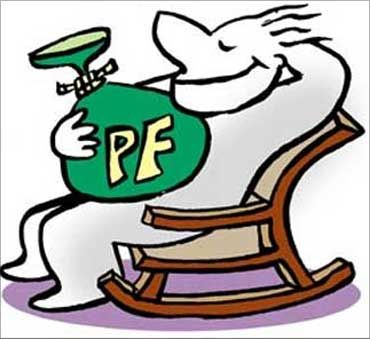 | « Back to article | Print this article |
 Apart from retirement or job loss, you can withdraw money from your employee provident fund for specified purposes such as children's marriage, house purchase and treatment of critical illness.
Apart from retirement or job loss, you can withdraw money from your employee provident fund for specified purposes such as children's marriage, house purchase and treatment of critical illness.
The withdrawal right is hemmed by many conditions.
Like a wedding card for your child’s marriage. You can’t fix the marriage date after withdrawing the money.
First, fix the marriage date, print the wedding card and give the withdrawal request, and then hope the money comes in time.
EPF has been criticised for allowing too many withdrawals, as people end up with very little money at the time of retirement.
A lot of withdrawals also happen when people change jobs.
They lie that they are jobless and withdraw EPF.
If despite the bureaucratic implementation of the facilities the withdrawals are so high, it is actually a vote of no confidence in the scheme administration.
Most of such withdrawals may be misguided but they are also prompted because the scheme administration is user-unfriendly and returns just about decent.
The EPF trustees have mulishly refused to invest any money in the equities market despite the good long-term performance of Indian equities.
Rules restricting withdrawal from a long-term saving scheme are acceptable, especially when contribution to such schemes is part-funded by the government in the form of tax breaks.
But whatever withdrawals are permitted should be administratively simple.
It is not right to assign highly detailed reasons and then make the subscriber run around for his own money.
Result: Many withdraw completely from EPF when they get a chance. The elaborate terms and conditions only encourage rent seeking behaviour from those who approve such requests.
National Pension System was designed in a modern way to avoid the mess EPF Organisation found itself in.
It has a centralised record-keeping agency that has rolled out an online system, with complete mobility.
Changes such as change of employer, fund manager, scheme, and so on are easily available and online.
But the Achilles’ Heel of any such system is the ease of withdrawal.
In NPS, the withdrawal is even more complicated than EPF since the current rules require compulsory annuity purchase from an approved annuity provider and only the balance is paid to the subscriber.
Since this is a long-term scheme, the number of withdrawals from the scheme have been few and are currently handled manually.
The Pension Fund Regulatory and Development Authority has just put out a 21-page draft guidelines on the withdrawal system for public comments that clearly bring out the challenges of crafting a withdrawal mechanism, even where the reasons for such withdrawal is not required to be validated.
The passing of the PFRDA Act has now brought fresh challenges.
Like EPF, limited withdrawals will be allowed for pre-specified reasons such as children's higher education or marriage, house purchase, treatment of critical illness, and so on.
Now, the NPS withdrawal system will also have to validate the reasons for it.
The draft primarily dealt with the reasons, withdrawal frequency and limits.
Once this is finalised, a bigger question will be how these reasons will be validated and whether the fund administration or the CRA will be involved in validating these reasons.
A humble suggestion: While the rules can provide for documents to be submitted along with the withdrawal application, it should basically rely on the subscriber’s statement and not a huge bureaucratic set-up to validate the reasons.
After all, the subscriber is not withdrawing from his own pension corpus. In the process of curbing unnecessary withdrawals the scheme administration should not be made cumbersome and unfriendly.
There is still no clarity on how NPS will provide for the guaranteed return product mandated under the Act.
Hopefully that will also not lead to any administration issues.
The negative image of EPF is entirely due to inefficient and unfriendly administration, which is only partly due to the cumbersome and arcane rules governing this scheme.
Hopefully, PFRDA will learn from the experience and avoid falling into the same trap.
The writer is CEO, ApnaPaisa.com